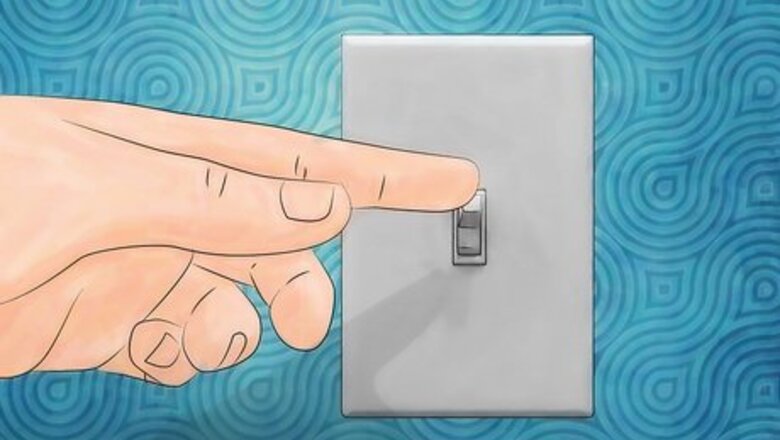
views
Cleaning with Crystals On
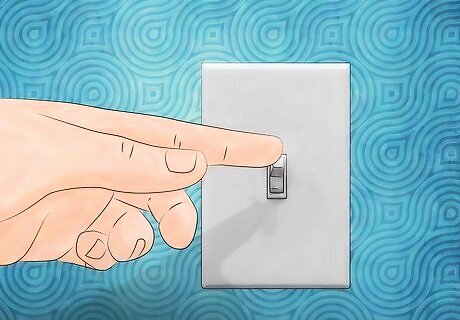
Turn the light off and let the bulbs cool. Switch off the light switch that controls the power for your chandelier. Wait until the light bulbs on your fixture feel cool to the touch. You can disconnect the electricity as an extra precaution, but only do this if you are confident in operating your home’s circuit breaker or have assistance from a knowledgeable electrician. You should not need to adjust any electric wiring in this process.
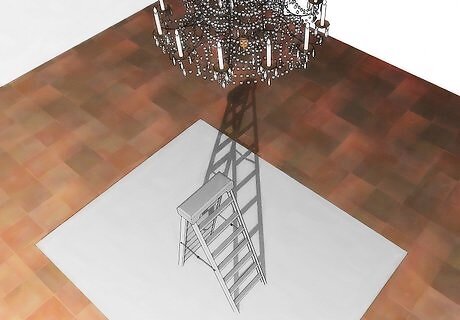
Prepare the area. While you’re waiting for the bulbs to cool, prepare your workspace. Place a tarp or drop cloth over the floor under your chandelier, and set up a stepladder or taller ladder securely under the chandelier. To prevent any parts dropping and breaking, you can lay down a thick blanket to absorb the fall. Make sure your ladder is at a height that is comfortable to reach all parts of the chandelier.
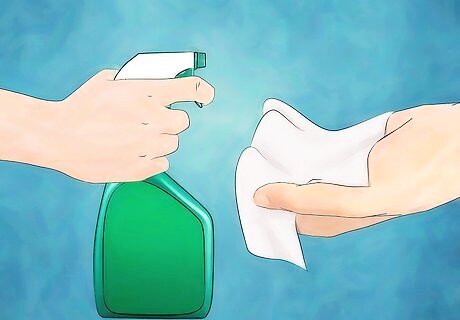
Use glass cleaner and clean cotton cloth. Working on your ladder where you can reach the chandelier, spray a glass cleaner or specific chandelier cleaner on a cotton cloth that is clean and soft. Wipe down each crystal with the damp cloth, then immediately dry with a separate dry cloth. Try wearing an apron with pockets while you work, so that you can keep the cleaner, cloths, and any other supplies easily on hand. Instead of two cloths, you can wear two soft cotton gloves for better control and dexterity. Spray one glove with the cleaner to wipe crystals down, and keep the other glove clean to dry them. If you have a lot of crystals, you may want several pairs of gloves.
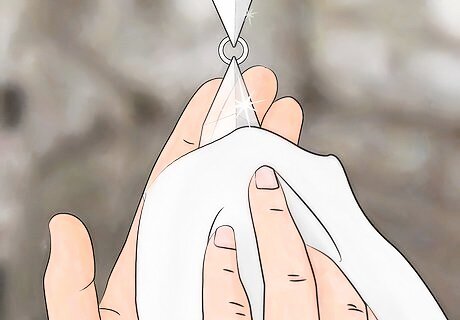
Clean all crystals carefully. Work your way around the chandelier to clean every crystal with your cleaner and cloth, wiping with the damp cloth or glove and drying with the clean one. When cleaning the crystals, always spray cleaner onto a cloth first, rather than directly onto the fixture. While cleaning, don’t twist or rotate the chandelier to access each side or part. This could damage or weaken its parts or supports, risking falling and breakage. Instead, carefully descend and move the ladder to position yourself in the right spot to reach and clean each part separately.
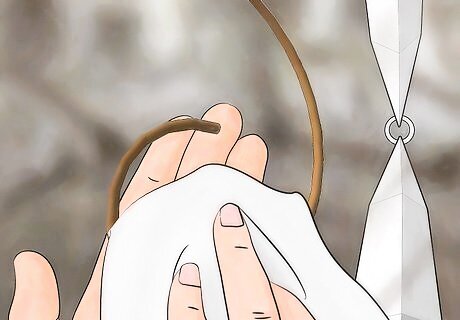
Clean the frame. Wipe the frame and any other parts of your chandelier with just a dry cloth or an appropriate chandelier cleaner or metal cleaner. Ensure that you use a cleaner that is intended for the type of metal or other material that your chandelier frame is made out of, otherwise you run the risk of discoloring or tarnishing it. Clean any metal hooks or fasteners for the crystals with a dry cloth only, as cleaner can tarnish or strip the finish off of them.
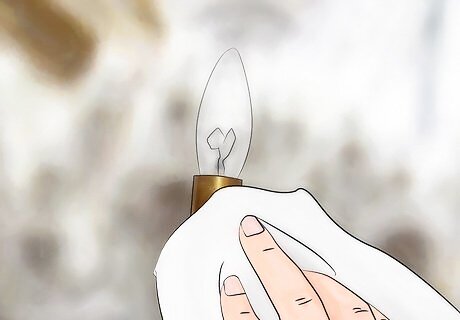
Dust light bulbs gently. Clean off the light bulbs in your fixture with a clean, dry cloth. Make sure that all bulbs are screwed in properly and don’t appear browned or discolored. If any light bulbs are dim, burnt out, broken, or missing, take this opportunity to change them out with new bulbs of proper wattage. If a bulb appears to have more stubborn stains, you can very gently clean it with a cloth damp with cleaner, or replace the bulb entirely.
Cleaning with Crystals Off
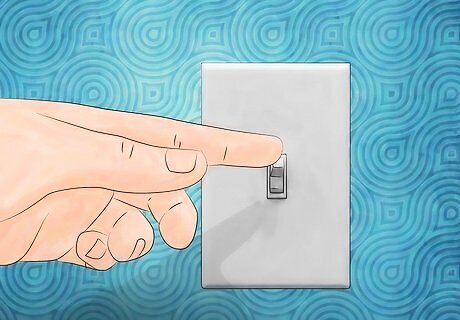
Turn off the light to let the bulbs cool. Turn off the power that controls your chandelier. Wait to do any work until the light bulbs on your fixture feel cool to the touch. You do not need to disconnect the electricity, but you may as an extra precaution since this step involves disassembling the fixture. Disconnect power from the room only if you are confident in operating your home’s circuit breaker or have assistance from a knowledgeable electrician. You should not need to adjust any electric wiring in this process.
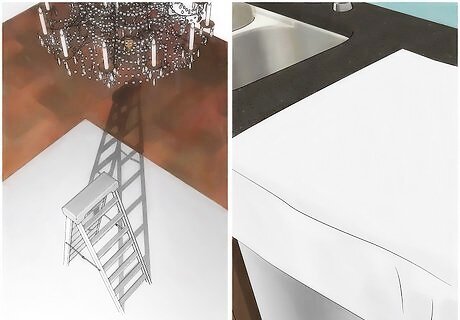
Prepare the area. While you’re waiting for the bulbs to cool, prepare your workspace. Place a thick blanket on the floor under your chandelier, as well as across a nearby table or whatever surface you plan to place chandelier parts on. Set up a stepladder or taller ladder securely under the chandelier. A heavy, thick blanket or cloth is essential for underneath your workspace, as it will soften the landing and prevent breakage in the case of pieces falling during disassembly. If you don’t have one, fold over another cloth several times to make it thicker. Make sure your ladder is at a height that is comfortable to reach all parts of the chandelier. Inspect your chandelier and take photos from several different angles and distances so you will remember how to reassemble it later.
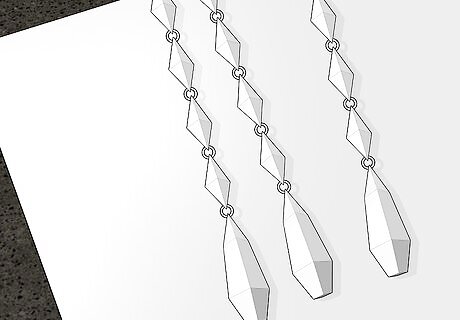
Disassemble the chandelier carefully. Carefully remove each crystal from the chandelier and place it on a nearby surface that is stable and covered with a blanket or thick cloth. You may disassemble other larger parts of the chandelier or take down the whole fixture entirely if it is possible to do so safely and without affecting wiring or the fragile parts of the chandelier. You may need needle-nose pliers or a similar tool to unfasten each crystal piece, depending on your chandelier. You can also use them to reshape the crystal fasteners during reassembly to strengthen them.
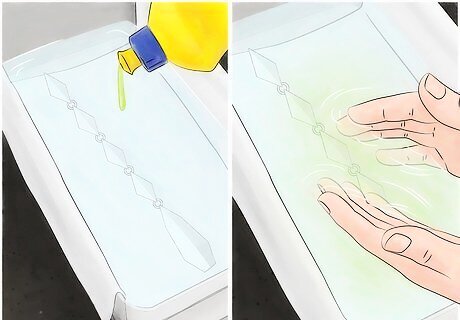
Clean the crystals carefully. Fill a sink with warm water and a small amount of mild dish soap. Line the sink with a cloth or towel to provide padding. Place crystals into the padded sink and rub each one separately with your fingers in the soapy water before rinsing and placing on a soft, clean towel. Take care to prevent crystals from hitting against each other or against hard surfaces of the sink to avoid cracking or chipping. There is no need to use a sponge or brush to clean crystals with the soapy water, and in fact this could end up scratching them. Dry the crystals with a soft, absorbent cloth immediately after rinsing. This is essential to preventing dried water spots from forming.
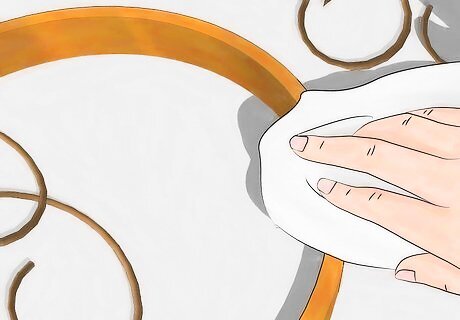
Clean the frame and other parts. If you need to, clean the frame, bulbs, and any other parts of the chandelier with a soft, dry cloth. Replace bulbs if they are dim, broken, or discolored. You may be able to use the same soapy water or other cleaner on the frame or other parts of the chandelier. Check first about the variety of metal or other material they’re made out of to find the right cleaner for it. Be sure to thoroughly dry any moisture that has remained in light bulb sockets or other areas of electrical connection. Dry as best you can with a cloth, then leave parts out to dry further for several hours before assembly if necessary.
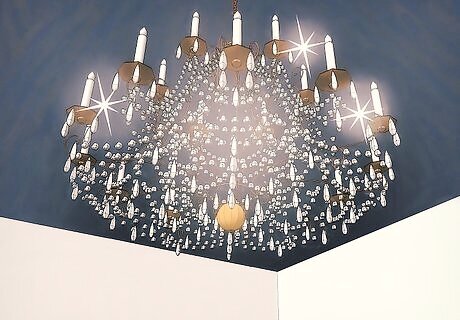
Reassemble the chandelier. Work from your photos or memory to replace all parts, bulbs, and crystals to where they belong in the fixture. While assembling, work from the top down and from inside to out to put all the pieces back together easily.
Knowing When to Clean Your Chandelier
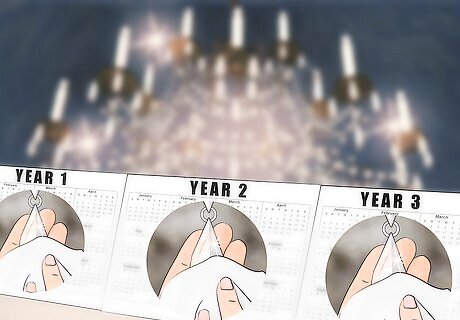
Try to clean every 12 months. Aim to clean your chandelier with either the “crystals on” or “crystals off” method every year for a fixture that remains shining and bright. Observe your chandelier periodically for visible dust, cloudy crystals, or spots. These are all indications that you should clean your fixture right away. Clean more often if your chandelier is located in a kitchen, as it will build up more grease and grime than in other areas of the house. Entryways are another area in which a chandelier may need more frequent cleaning.
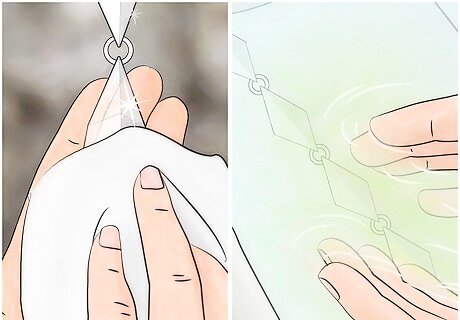
Decide on a deep or shallow clean. If you’ve never cleaned your chandelier, opt for a deep clean by performing the “crystals off” method. Otherwise, the less time-intensive “crystals on” method will typically suffice for regular cleaning. Choose a deeper clean particularly if there are stubborn spots or a cloudy, milky quality to the crystal that isn’t removed by a simple dusting.
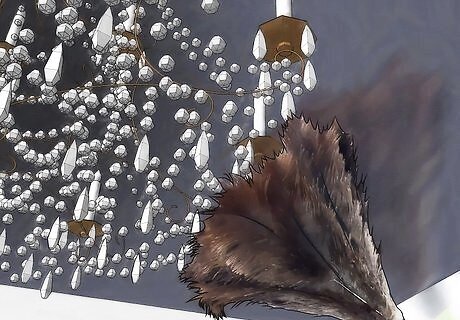
Dust in between cleanings. To make your clean last longer, use a soft feather or lambswool duster to lightly clear dust from the frame and crystals. You'll need a stepladder, but you do not need to disassemble the fixture. A good general rule is to dust every few months, or whenever you notice a visible layer of dust or haziness on the crystals, frame, or bulbs. It’s also a good idea to dust before any wet cleaning, as you can remove larger dust and dirt particles ahead of time.













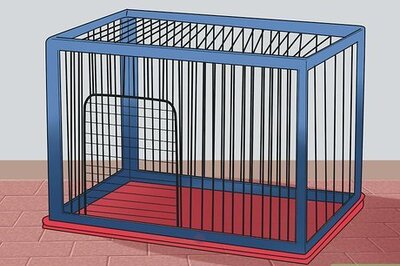






Comments
0 comment